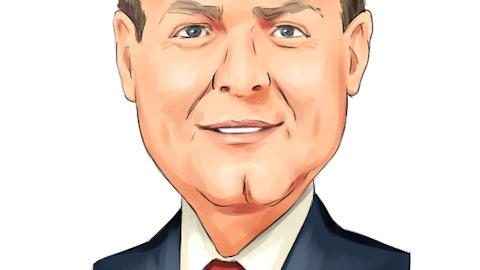Our business is back to where it should have always been, which is, volume and issuance are directly and highly correlated. And those issuance volumes are gigantic, and the volumes in our business will grow, and you will see these numbers continuously grow. And we are very excited about where things are going, because they are just going back to where they always should have been. This is not a new path we’re cutting. It’s just shocking that we were off the path for 14 years. Made no sense. But then again, if I told you, 14 years ago, the governments were going to buy all their debt and printed with their own money, you would laugh at me.
Gautam Sawant: Thanks. And just last question here for me on the capital deployment priorities. Can you expand on the Trident acquisition and I guess, decision-making around repurchases in the fourth quarter of 2022? And how we should think about, I guess, the level of repurchases in the second half of 2023?
Howard Lutnick: So basically speaking, we make more money in the first half of the year, but we collect it in the second half of the year. So generally speaking, as Jason said, we’ll be more aggressive in buying back shares in the second half of the year, because our cash flow is just better, because we collect the bigger numbers in the second half of the year. You are correct. We just bought a commodities brokerage company called, Trident. And we’re going to continuously invest in the business. Obviously, we view our growth path as very, very attractive now. So we’re going to buy other companies and buy assets that we think are going to grow more quickly. However, we did say that, we feel that our stock is very attractive at these multiples and you should expect us to buy more shares.
So I think we’re going to continuously balance that, as we go forward through the year, but we have great opportunity to grow now which we just didn’t have in the past, right? We were a catalyst company, because that’s all we could do is just buy and sell companies and build businesses, because our core business really wasn’t growing. Now our core business is growing across the board and our opportunity to invest across our business is just much more exciting. So we have to balance that. That is different than in the past. I know many of our shareholders in the past would say, why aren’t — when are you buying back shares? And when you saw — when we sold our insurance business, we bought back a huge amount of shares. As Jason said, 71 million shares.
But the opportunity of this company is changed. The growth is there and our ability to grow our business and get great returns for our shareholders, I think is in front of us. And we’re going to balance buying our shares back, which we find very attractive, but also investing in our business, which we now also find very attractive. That may be different from what it was five years ago and seven years ago, but it is a really, really good place now. And it is a lot of fun to debate, which is better, because they’re both great choices.
Gautam Sawant: Understood. Thank you very much.
Operator: Our next question is from Rich Repetto with Piper Sandler. Please proceed.
Rich Repetto: Good morning, Howard. Good to speak with you. So the first question is more of a nuanced question. I believe rates helped you as well. But just trying to understand, I looked — I just looked at the brokerage revenue in rates and in credit, they’re actually down a little bit, 2022 versus ’21. And I know that could be FX. But when you look at the CME’s interest rate, revenue and volume, it was up 18%. So can you talk about, like the nuances of why, I guess, the banks and then your customers will better — there’ll be more activity with the banks this coming year rather than last year when the CME and the CME is also up 23% year-to-date so far in volume — excuse me, in rates. But can you talk about why the lag effect with your platform?




